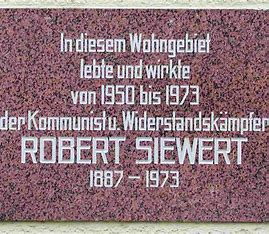Memorial plaque for Robert Siewert in Berlin
Photo: Archive
In fact, streets in Berlin, Chemnitz and Weimar are still named after him today. On the other hand, schools in Brandenburg and Saxony lost his name; after all, Robert Siewert (1887–1973) was one of the most decorated personalities of the “unjust state”. But hardly anyone knows the carpenter Robert Siewert, who joined the SPD in 1906 and came to the KPD via the USPD, which excluded him as a “conciliator.” With other communists who were critical of the party’s course, he formed the KPD-O. The O stood for opposition. However, some loyalists said “KPD zero”. That was definitely meant in a derogatory way. And this mark of Cain remained with Robert Siewert until the end of his life.
As a convinced communist, he actively resisted the Nazi empire. The prison was followed by the Buchenwald concentration camp in 1938 – until the bitter end. Siewert was a member of the illegal camp management there and survived his impending execution solely by liberating the camp itself. He spoke honorably at the memorial service for the murdered Ernst Thälmann, who caused his exclusion a decade and a half earlier. After the war, Siewert became a victim of the next party purge. He was later rehabilitated and showered with medals. The flaw stuck: “Compromiser.”
nd.DieWoche – our weekly newsletter

With our weekly newsletter nd.DieWoche look at the most important topics of the week and read them Highlights our Saturday edition on Friday. Get your free subscription here.
Harald Jentsch has now presented a very knowledgeable and extensive biography about this man, whose urn grave is on Pergolenweg next to the Socialist Memorial in Berlin-Friedrichsfelde. Born in Leipzig, he has been studying the history of the workers’ movement since 1993 and received his doctorate in Darmstadt in 2004 with the thesis “The KPD and the ‘German October’ 1923. A contribution to political sociology”. Jentsch, a metalworker trained in Borna, studied at Leipzig’s Karl Marx University from 1985 to 1990 and then worked in various commercial companies and social institutions. He has been a member of the general staff council of the Offenbach city group since 2016. This development alone is unusual and therefore worth mentioning.
33 years after the end of the GDR, there is now the first Marxist biography of a man who, despite his upright attitudes, was at times severely harassed in the SED and who, at the end of his days, was appropriately respected and honored by the GDR. Karl Schirdewan, grandfather of the current head of the Left Party, as chairman of the Western Commission justified the need to purge the SED by saying that the “agents of the imperialists, the Trotskyists, the Tito people, the Lenin alliance members and the Brandler people” had managed to get into positions to sneak into the party, which is why “a ruthless removal of party enemies must be carried out.” By May 1952, around 150,000 members and candidates had been expelled.
Robert Siewert, one of these “Brandler people,” was forced to express self-criticism in this newspaper. On January 25, 1951, his self-accusatory article appeared in the central organ under the heading “The path of the KPO – from an anti-party group to betrayal of the working class.”
Ten percent of the 1,800 former members of the KPD-O recorded in party statistics were expelled from the SED. Siewert had already been dismissed as Interior Minister and Deputy Prime Minister of Saxony-Anhalt before the GDR was founded and was ordered to Berlin on September 5, 1949 by resolution of the Small Secretariat of the SED Central Committee. At the age of 62, he became an important man in the Ministry of Construction and was responsible for the new housing program.
He was also active in national and international anti-fascist committees. On February 27, 1961, for example, Siewert traveled to Hanover on behalf of the Presidium of the Committee of Antifascist Resistance Fighters to speak to Lower Saxony’s Prime Minister Hinrich Wilhelm Kopf (SPD) about the participation of 10,000 East German antifascists in the Easter memorial march to the former Bergen-Belsen concentration camp. First he was stopped by West German border officials: “Mr. Siewert, your visit is not welcome in Hanover.” After consultation with Hanover, he was allowed to continue driving. But in the Prime Minister’s office he was told that he could not be spoken to. Siewert’s request to possibly speak to a responsible employee was also rejected.
On his 80th birthday, Siewert ended his professional career in the Ministry of Construction at the end of 1967. If Minister Wolfgang Junker hadn’t placed his hand on his shoulder as he congratulated him and said, “It’s over now, Robert!”, Siewert would probably have remained a research assistant there longer.
Harald Jentsch has created a documented biography of a man who, like so many of his peers, has now been forgotten. This is not just due to the anti-communist present, in which everything that looks like a social alternative is mercilessly plowed under. Reading such biographies makes us aware of the shoulders we stand on and who helped to found this anti-fascist, anti-Semitic, enlightened civil society, which many people take credit for today.
Harald Jentsch: Robert Siewert. A biography. Verlag am Park in Edition Ost, 396 pages, br., 25 €.
#ndstays – Get active and order a promotional package

Regardless of whether it is pubs, cafés, festivals or other meeting places – we want to become more visible and reach everyone who values independent journalism with an attitude. We have put together a campaign package with stickers, flyers, posters and buttons that you can use to get active and support your newspaper.
To the promotional package
link sbobet sbobetsbobet88judi bola sbobet judi bola online
